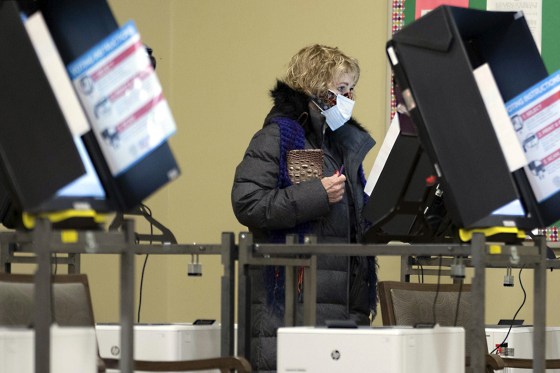WASHINGTON — Across the country, Republican-controlled state legislatures have done more than pass voting restrictions after losing the 2020 presidential contest.
They’ve enacted or drafted provisions that create new election powers, change election administration and punish election officials who don’t perform their duties — which all have the potential of injecting chaos into the counting of the next presidential race.
Here are just a few examples:
- In Georgia, the bill that was signed into law removes the secretary of state from the State Elections Board and replaces that position with a legislature-appointed chairperson. It also gives the State Elections Board power to suspend county or municipal election workers.
- In Arizona, Republicans are moving forward on a measure that would prevent the Secretary of State (who’s a Democrat) from defending election lawsuits — but only until 2023, after the next election cycle in the state.
- In the Texas legislation that’s been blocked — at least for now — Democrats were particularly alarmed by a provision that would have dictated that, if the number of votes deemed illegally cast in the election is equal to or greater than the number of votes necessary to change the outcome of an election, the court could declare the election void without attempting to determine how individual voters voted.
- In Arkansas, a new law empowers the State Board of Election Commissioners to, upon finding a “violation of the voter registration laws or election laws” occurred, either decertify an election official or have the state board take over election administration in “severe” cases.
And in several states around the country, pending or passed legislation would also levy hefty fines — or even criminal penalties — on elections officials for failing to follow the law to the letter.
Hurdles to voting can be overcome — by voter-education campaigns, new mobilization efforts and lots of money.
But when you change the rules regarding how the votes are counted or who is counting them, well, that becomes a whole lot harder to overcome.
And as the New York Times’ Nate Cohn observes, none of the legislative measures national Democrats are considering — like HR1 or the John Lewis Voting Rights Act — address what these states are pushing.
What Biden wants in the infrastructure bill
Yesterday, we asked what the minimum President Biden is looking for in any kind of bipartisan infrastructure deal.
And it appears we got an answer after the president’s meeting with Sen. Shelley Moore Capito, R-W.V.: $1 trillion, all of it new spending, and paid for by higher taxes on corporations.
From NBC’s Leigh Ann Caldwell:
“Sen. Shelley Moore Capito briefed the five other members of the Senate Republican negotiating team on her meeting with President Biden Wednesday night, a Republican source familiar says."
“Capito told the senators that Biden wanted $1 trillion in new spending and wanted it paid for with new taxes. Biden has called for the American Jobs Plan to be paid for with an increase in the corporate tax rate. 'New' spending means spending above baseline — spending in addition to what is already assumed will be spent on projects. The $928 billion GOP proposal included only about $250 billion in new spending."
"The GOP group is expected to come up with a counteroffer, likely Friday."
"Asked about Capito’s mood following the meeting, one source said she continues to be 'the happy warrior.’ Others in the group are less optimistic.”
Data Download: The numbers you need to know today
More than 100: The number of liberal groups who sent a letter to Senate Majority Leader Chuck Schumer urging him to nix the filibuster after Republicans blocked a bipartisan investigation into January 6.
29 days: The lifespan of former president Donald Trump’s blog, which was shuttered after failing to get much traffic.
33,474,185: The number of confirmed cases of coronavirus in the United States, per the most recent data from NBC News and health officials. (That’s 16,847 more than yesterday morning.)
599,574: The number of deaths in the United States from the virus so far, per the most recent data from NBC News. (That’s 589 more than yesterday morning.)
296,912,892: The number of vaccine doses administered in the U.S.
37.8 percent: The share of all Americans who are fully vaccinated, per NBC News.
51.9 percent: The share of all American adults over 18 who are fully vaccinated, per CDC.
Tweet of the day
ICYMI: What else is happening in the world
Biden says he’s “looking closely” at possible retaliation for Russian-linked cyberattacks.
The RNC is already saying it will boycott the 2024 presidential debates unless changes to the process are made.
George P. Bush is running for attorney general in Texas.
And Arizona’s secretary of state is running for governor.
The Washington Post writes that Trump is “increasingly consumed with the notion that ballot reviews pushed by his supporters around the country could prove that he won.”
Now we’re learning that the Justice Department under the Trump administration secretly obtained the phone records of some New York Times reporters.
The clock is still ticking on an infrastructure deal.
DOJ is investigating a Democratic lobbying firm for its Burisma work.
It looks like Netanyahu’s grip on power is finally coming to an end.




